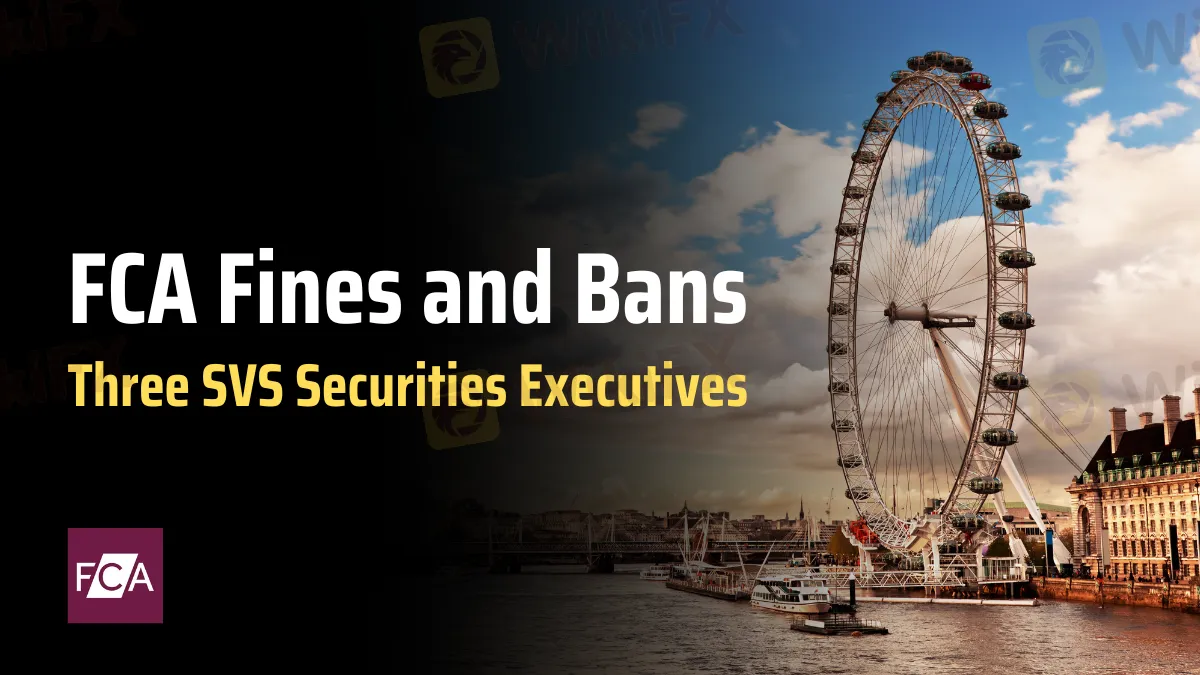简体中文
繁體中文
English
Pусский
日本語
ภาษาไทย
Tiếng Việt
Bahasa Indonesia
Español
हिन्दी
Filippiiniläinen
Français
Deutsch
Português
Türkçe
한국어
العربية
FCA Fines and Bans Three SVS Securities Executives
Abstract:The FCA fines and bans three SVS Securities executives for mishandling pension funds, risking customers' financial futures.

The Financial Conduct Authority (FCA) in the UK has imposed strong measures against three senior executives of SVS Securities after a lengthy investigation into the misuse of pension money. Demetrios Hadjigeorgiou, David Stephen, and Kulvir Virk have been penalized and prohibited for their involvement in a plan that deceived clients and endangered their financial well-being.
The investigation conducted by the FCA uncovered that SVS Securities allocated customers' pension funds to high-risk bonds, so breaching their obligation to prioritize the welfare of their consumers.
According to Therese Chambers, the Joint Executive Director of Enforcement and Market Oversight at the FCA, these three people, and SVS played a significant role in hiding the fact that clients' pension funds were being placed in bonds with a high level of risk. Customers had the right to rely on SVS to behave in their best interests, but instead, SVS consistently emphasized generating profits for itself and its colleagues.
Chambers highlighted the profound repercussions of the executives' acts, underscoring that such conduct may have transformative effects on customers, possibly jeopardizing their capacity to have a financially stable retirement.

The inquiry revealed that SVS Securities deliberately increased the amount of client money invested in high-risk, difficult-to-sell bonds and imposed concealed charges as high as 12%. This business strategy generated inherent conflicts of interest, giving precedence to the firm's revenue at the expense of its consumers' best interests. According to the FCA, a total of £69.1 million was invested by 879 consumers in these bonds, which have since defaulted. Consequently, clients are improbable to regain more than a little portion of their money.
Additional discoveries indicated that the executives displayed imprudent behavior by reducing the estimated worth of customers when they divested from fixed-income assets. By using this approach, SVS managed to keep 10% of the cash, resulting in a revenue of £359,800 at the cost of its clients.
Kulvir Virk, the ex-CEO and main owner of SVS Securities, was recognized as the mastermind behind the company's intricate corporate structure, which directed client cash into speculative bonds overseen by SVS directors and Virk's trusted allies. David Stephen, the individual responsible for overseeing compliance, was shown to have neglected his obligations in ensuring that SVS complied with regulatory regulations. Demetrios Hadjigeorgiou, the ex-finance director and subsequent CEO, faced criticism for his inadequate handling of conflicts of interest and failure to carry out thorough due diligence.
Due to their improper behavior, the Financial Conduct Authority (FCA) has levied significant penalties on the three executives. Kulvir Virk has been issued a punishment of £215,500, Demetrios Hadjigeorgiou has been fined £84,600, and David Stephen has been fined £52,100. In addition, Virk has received a permanent ban from working in the financial services industry, while Hadjigeorgiou and Stephen have been barred from holding positions in senior management.
The FCA's measures highlight the regulator's dedication to safeguarding customers and upholding the integrity of the financial services sector. The FCA seeks to deter future breaches of trust and ensure that corporations prioritize the well-being of their consumers by holding these people responsible.

Disclaimer:
The views in this article only represent the author's personal views, and do not constitute investment advice on this platform. This platform does not guarantee the accuracy, completeness and timeliness of the information in the article, and will not be liable for any loss caused by the use of or reliance on the information in the article.
Read more

Malaysian-Thai Fraud Syndicate Dismantled, Millions in Losses Reported
The Royal Malaysia Police (PDRM) has received 26 reports concerning the Nicshare and CommonApps investment schemes, both linked to a major fraudulent syndicate led by a Malaysian citizen. The syndicate’s activities came to light following the arrest of its leader by Thai authorities on 16 December.

WikiFX Review: Is FxPro Reliable?
Founded in 2006, FxPro is a reputable UK-based broker, trading on various market instruments. In this article, we will help you find the answer to one question: Is FxPro reliable?

WikiFX Review: Something You Need to Know About Markets4you
Markets4you, is a global forex broker launched in 2007. It was established in the British Virgin Islands. This broker offers its global traders various market instruments.

SEC Approves Hashdex and Franklin Crypto ETFs on Nasdaq
The SEC has approved crypto index ETFs by Hashdex and Franklin Templeton, including Bitcoin and Ethereum, marking a milestone in crypto asset investment.
WikiFX Broker
Latest News
ASIC Sues Binance Australia Derivatives for Misclassifying Retail Clients
Geopolitical Events: What They Are & Their Impact?
Top 10 Trading Indicators Every Forex Trader Should Know
WikiFX Review: Is FxPro Reliable?
Malaysian-Thai Fraud Syndicate Dismantled, Millions in Losses Reported
Trading frauds topped the list of scams in India- Report Reveals
Why Do You Feel Scared During Trade Execution?
WikiFX Review: Something You Need to Know About Markets4you
Revolut Leads UK Neobanks in the Digital Banking Revolution
Fusion Markets: Safe Choice or Scam to Avoid?
Currency Calculator


